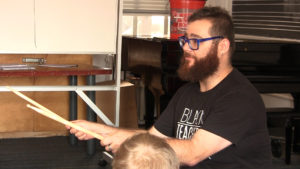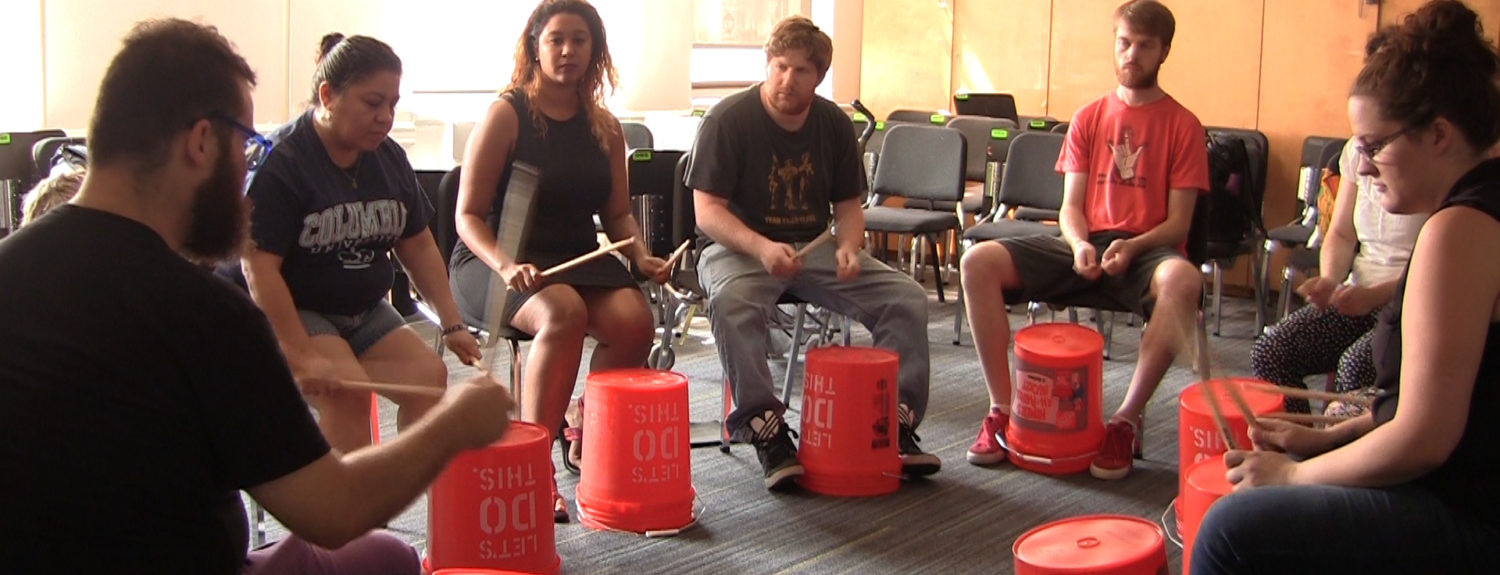Education
Drumbeats for Justice
By Aishamanne Williams
Spectrum staff
The dozen or so teachers were stomping their feet, clapping their hands and chanting:
“We who believe in freedom cannot rest … ” they shouted and sang, standing in a circle inside a classroom at NYU’s Steinhardt School of Culture, Education, and Human Development.
Taped to walls of that room were slogans and quotes from such iconic social activists and thinkers as Angela Davis, Paul Coelho, Bell Hooks and others promoting social and political equality.
“One of the things that is really killing the youth is apathy,” said workshop leader Martin Urbach, a drummer and educator who uses music to teach other educators how to engage students in justice issues and work toward creating a more just society.
“We combat apathy with activism,” Urbach added. “We look at how artists can become changemakers in their own communities. Kendrick Lamar is not just rapping; he’s saying things that need to be said. Before he was doing it, Miles Davis was doing it. Artists are the bringers of change.”

Urbach launched that Saturday morning’s “Engaging Youth in Social Activism, Inside the Classroom” workshop through his organization, Liberation Drum Circles.
For himself, Urbach is concerned about Black Lives Matter, immigration reform and other issues that affect people of color, even though he is white.
His 8-year-old organization trains youth and educators by, first, detailing the cause and effect of certain social, political, economic and related situations. From there, trainees discuss current events in the classroom and create their own songs based on how they and their students analyze issues.
“We use drumming, singing and chanting as a means to create communities. We look inward and look at what makes us feel great about the world,” Urbach said. “We do affirmations and drum our affirmations, talk about our hopes and our dreams. And, then, we talk about oppression and what is wrong with the world.”
“Active participation in any of the music of the African Diaspora is itself a form of social justice,” said Ethan Hein, 42, who teaches music technology and is Urbach’s friend.
“I came to the workshop … in search of like-minded educators to connect with,” said Samantha Bosch, 30, who recently moved from Seattle, Wash. to New York City to teach and to study in the Lincoln Center Scholars-Hunter College creative arts education program.
She continued: “Giving someone the tools to make music is the quickest way to give them power and direction over their own narrative.”
Urbach told the educators who’d shown up that he wanted to discuss things from a place of “togetherness and kinship.” So, they started with an icebreaker. Each educator introduced himself or herself by name.
“We can’t have community if I don’t know your name,” Urbach said.
Then, they clapped and patted their chests and legs, becoming what Urbach calls “body percussion cyphers.” After they drummed on the bottom of paint buckets, he asked the teachers, “How did music-making feel in your heart and mind?”
“I feel my spirit start to lift. It’s very refreshing,” one of the teachers said.
“That’s a great answer,” Urbach said. “The world outside is trying to make us not feel good, so coming inside and making music to feel good is very powerful.”
Urbach found his passion for both music and social justice as a young person growing up in Bolivia. “As a child, I saw that a lot of poor people didn’t have access to … drinking water. Witnessing that made me realize that it’s up to us, the people, not to allow the injustices to happen.”
As a boy, he watched Bolivian protesters drum and chant their message during demonstrations. That was Urbach’s first inspiration on the activist front.
Olodum, a globetrotting Afro-Brazilian performance troupe, also inspired him. That group of dancers and singers–they were featured in Michael Jackson’s “They Don’t Care About Us” music video–takes its arts-based activism to carnivals in Brazil’s mostly black and largely poor state of Bahia. The group’s seminars focus on racial discrimination and economic inequality.
It is not lost on Urbach that he is a white man whose work mainly targets youth of color. “Just because it doesn’t affect me right now doesn’t mean I get to stay silent,” Urbach said.
Still, he added, “The world doesn’t need another white privileged man in the spotlight, so I try to stay out of the spotlight and help where I can.”
Urbach said his ultimate aim is simple: “At the core of it all, we all want the world to be a better place.”


